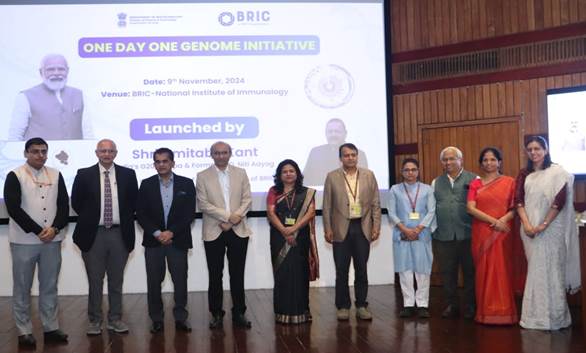New Delhi: The Department of Biotechnology (DBT) and Biotechnology Research and Innovation Council (BRIC) have launched the ‘One Day One Genome’ initiative, a pioneering effort to highlight the vast microbial diversity of India and its significance in environmental sustainability, agriculture, and human health. The program was unveiled by Amitabh Kant, India’s G-20 Sherpa and former CEO of NITI Aayog, during the first foundation day celebrations of BRIC at the National Institute of Immunology (NII) in New Delhi on November 9, 2024.
The initiative focuses on genome sequencing to uncover the immense potential of India’s unique bacterial species. Microorganisms are essential to life on Earth, playing critical roles in biogeochemical cycles, soil fertility, organic waste degradation, and pest control. They also form an integral part of the human body, aiding in digestion, immunity, and mental health. While pathogenic microorganisms can cause diseases, non-pathogenic microbes provide a defense against them, ensuring the delicate balance required for human well-being.
According to Kant, the sequencing data generated through this initiative will open new avenues for understanding microbial capacities, including the production of enzymes, antimicrobial resistance, and bioactive compounds. Such knowledge is expected to significantly advance efforts in environmental management, agricultural development, and healthcare innovations.
The program, coordinated by BRIC-National Institute of Biomedical Genomics (BRIC-NIBMG), aims to release fully annotated genomes of bacteria isolated in India, making the data freely available to the public. Each genome release will include detailed graphical summaries and annotations, offering insights into the scientific and industrial applications of these microbes. This effort is intended to democratize microbial genomics, making the data more accessible to researchers, industries, and the broader public.
The initiative underscores the vital role of microorganisms in sustaining ecosystems and enhancing human life. Genome sequencing under this program will contribute to better environmental protection, improved agricultural practices, and advancements in human health. By integrating microbial genomics with India’s broader innovation ecosystem, the ‘One Day One Genome’ initiative represents a transformative step toward leveraging science for sustainable progress.





